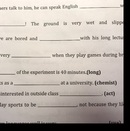Giúp mik với ạ
Hãy nhập câu hỏi của bạn vào đây, nếu là tài khoản VIP, bạn sẽ được ưu tiên trả lời.


1. Thiếu đề
2. Is there a music room at your school ?
=> Does your school have a music room ?
3. How much time do you spend learning Math ?
=> How long does it take you to learn Math ?
4.Thiếu đề

a / gentle / so / there / girl / so / and / who's / kind / is / ?
Is there a girl who's so kind and so gentle ?
Học tốt!

is / the / clever / and / main /a /generous / character / man
=> The main chacracter is a clever and generous man .
_ Hok tốt _
is / the / clever / and / main /a /generous / character / man
The main character is a clever and generous man.
Học tốt!

1.He’s always in a rush. I don’t understand why he walks so _____quickly_______ 2.(quick/quickly).
3.I prefer studying in the library. It’s always_______quiet________ (quiet/quietly).
4.Michael ______happily____ (happy/happily) took the assistant job. He had been looking for a position all summer.
5.Marta dances ______beautifully_______ (beautiful/beautifully). She’s been taking ballet since she was five years old.
6.They speak French very ____well________ (good/well). They lived in France for two years.
7.My neighbor always plays ____loudly_______ (loud/loudly) music on the weekends. It’s so annoying.
8.Please be ____carefull______ (careful/carefully) in the hallway. The walls have just been painted.
9.Dan is very smart, but he is not a very____good_______ (good/well) student.
10.He reacted _____angrily _____ (angry/angrily) to the news. I have never seen him so upset.
11.We didn’t _____completely_________ (complete/completely) understand the teacher’s instructions. Most of us did not finish the assignment.
12. He drives …carefully….( careful/ carefully)
13.The girl is …slow….(slow/slowly)
14. She speaks English…perfectly….( perfectly/ perfect)
15.Our teacher is …kind……( kind / kindly)
16.My neighbor is a…loud…( loud /loudly) speaker.
17. He writes…badly.. ( badly/bad)
18.Jane is a nice…( nice/ nicely) guitar player.
19.He is a good…(good/ well ) painter.
20. She does her job quietly (quietly/quiet)
21.This exercise is easy ( easy / easily)

mk cop mạng!
Can, Could và Be able to đều mang nghĩa là có thể nhưng chúng có cách dùng tương đối khác nhau trong đó: Can Để chỉ một việc gì đó là khả dĩ hoặc có khả năng làm việc gì. Could là hình thức quá khứ của can nên nó cũng có cách dùng như can. “Be able to” có thể thay thế được cho “can”, nhưng “can” thì thường gặp hơn
k cho mk nha !làm ơn !!
*Can
+) S + can + V -nguyên
-)S+ can not/ can't + V-nguyên
?)Can + S +V-nguyên
-Dùng để chỉ ai đó có thể hoặc ko thể làm việc gì
*Could
+)S + could + V-nguyên
-)S+ could not/ couldn't + V-nguyên
?) Could + S + V-nguyên
- Could dùng để:
+ Chỉ sự yêu cầu
+ Chỉ sự cho phép
+ Thể hiện kết quả
+ Bày tỏ khả năng
+ Gợi lên đề nghị

I/ dùng từ gợi ý viết lại thành câu sao cho nghĩa ko đổi
1 we started living here in 1995
we have lived here since 1995
2 it's unneccessary for us to drive so fast
we don''t have to drive so fast
3 Trung is the most intelligent student in my class
No one in my class is more intelligent than Trung
4 The coffee was too weak to keep us awake
The coffee wasn't enough strong to to keep us awake
5 Huong last wrote to her parents two months ago.
Huong hasn't written to her parent for two months

My brother doesn't get up at 6'clock because he doesn't go to school


2/
a. easy
b. easily
3/
a. quiet
b. quietly
4/
a. beautifully
b. beautiful
5/
a. safe
b. safely